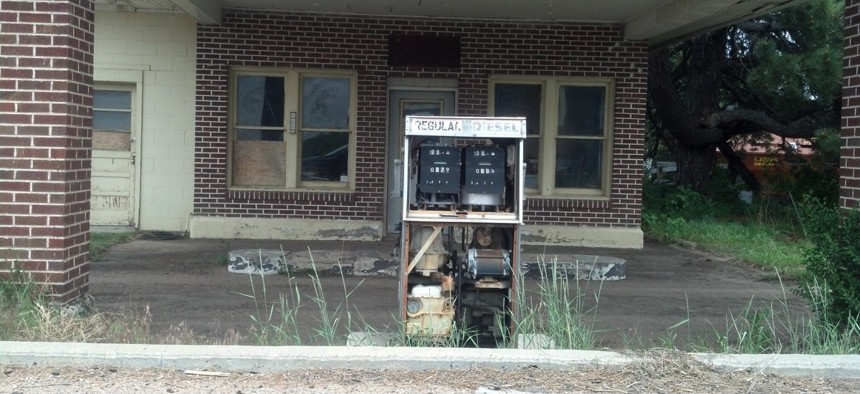Ready or Not: Expect More Economic Disruption From Automation

An abandoned gas station in Roscoe, Nebraska (Photo by Michael Grass / RouteFifty.com)

Connecting state and local government leaders
Are state and local government leaders to prepared to deal with workforce impacts that will come with continued innovation?
RICHMOND, Calif. — The topic of job creation has been an overarching theme in the 2016 presidential campaign. Donald Trump says he’ll “bring back the jobs.” Hillary Clinton has laid out a variety of strategies to boost job growth. But the craziness of the election cycle has drowned out thoughtful discussion of the future of work in the United States, among other issues.
With this, there are questions of national—and global—importance that should have had more attention during this presidential race.
As the speed of automation continues to increase and eliminates the need to have humans employed in certain professions, how should government respond to the very real and disruptive forces that will upend the labor market and put a lot of people out of work? Also, what can be done to help those whose livelihoods have already been disrupted by evolving technology?
“More and more people are feeling left behind,” Sandhya Anantharaman, co-director of the Universal Income Project, said during an address at the 10th annual innovation-focused Meeting of the Minds gathering at the Craneway Pavilion near San Francisco on Thursday.
“We need to have a new social contract,” she said,” a social contract that updates the American Dream, which has traditionally linked hard work to success but isn’t well suited to deal with the social challenges that come from the decoupling of labor and income.
Anantharaman is an advocate for the universal basic income, a concept where every citizen is provided with a government subsidy that provides “an income floor” and replaces traditional social welfare programs.
That would allow people who are “struggling to scrape by”—firefighters, teachers, caregivers and others providing critical services to their communities—to have more a more stable quality of life and allow others to pursue their passions and, perhaps, develop future innovations.
There’s an interesting ongoing global discussion around the universal basic income. Some pilot projects are underway around the world to study its impacts, including one in Oakland, California, and see whether there’s a sustainable way forward.
Leading minds in Silicon Valley are looking more closely at it too, as they realize how their innovations destabilize vulnerable segments of society. For all the positive buzz it’s received, the universal basic income has its skeptics, too.
One way or another, we’re going to be discussing this concept in the years to come thanks to the innovations in automation that will make this future reality inevitable.
This discussion always brings me back to places like Roscoe, a “semi-ghost” town in western Nebraska, that was bypassed when Interstate 80 was constructed in the 1960s and ’70s. I visited this part of Nebraska a few years ago, and a prominent feature in Roscoe is an abandoned gas station along the old Lincoln Highway, the nation’s first paved transcontinental roadway.
When I-80 opened, services for cross-country travelers, including truckers, shifted elsewhere, leaving places like Roscoe relics of an earlier era in transportation.
So what happens when automation in the trucking industry disrupts the local economies of today’s truck-stop towns? As I wrote last year for Route Fifty:
[I]t’s safe to say that the future industry disruption that driverless semi-trucks hauling freight will bring is poised to cause some serious pain for local communities that depend on human truck drivers.
While humans won’t be totally eliminated by automation in the trucking and logistics industry, fewer human truck drivers means fewer dollars spent at local restaurants, convenience stores and related services.
What happens to all those future out-of-work truck drivers and truck-stop cashiers?
It’s a looming “one-two punch to America’s gut,” New Orleans-based universal basic income advocate Scott Santens wrote last year in a Medium post. And that will have a ripple effect that many local economies simply aren’t prepared for.
Disruption in the trucking industry is an uncomfortable prospect for sure and one that poses significant long-term economic development challenges for state and local government officials who will be dealing with these challenges.
Naturally, continued automation impacts more than just the trucking industry.
Advocates of the universal basic income believe it provides a solution—and opportunities—for the future.
“Change is inevitable, but this type of progress is not,” Anantharaman said.
So ready or not, more economic disruption is coming. Is your community ready to meet these difficult challenges that are just down the road?
“It’s time that we updated our social project for the 21st century,” she said.
Michael Grass is Executive Editor of Government Executive’s Route Fifty and is based in Seattle.

NEXT STORY: Labor Department Rule Gives States Flexibility to Help Boost Retirement Savings





